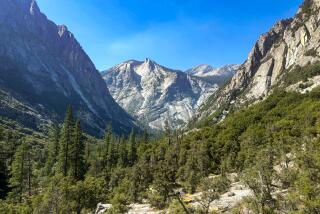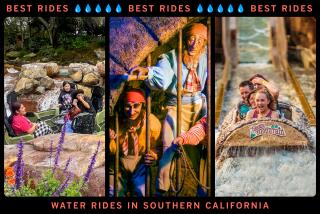Gorging on Serenity : Jerkwater Canoes Provides the Means, but You Must Discern the Ways During Peaceful Trips Down the Colorado River
- Share via
TOPOCK, Ariz. — As winter storms move into the Southwest, Southern California’s air conditioners click off and the Colorado River flows quietly through ancient canyons and marshes.
The river is biding its time, storing its power behind dams for the wallop it will deliver when asked again to turn the mighty turbines that light up Los Angeles. Meanwhile, minimal power mean low flows--too low to launch anything but a canoe in some places.
“There are two things about this,” Ernie Roche says, noting that the water level has dropped below the launch ramp since yesterday. “There won’t be any other boats on the river--but I won’t be able to come and get you if it rains.”
Thus, Roche sends another canoe off on the Colorado, as he has been doing for more than 30 years from his Jerkwater Canoe Company base downstream from Needles, near where California, Arizona and Nevada are joined. Ahead lie 17 meandering miles through the Topock Gorge without marinas, road signs, or outboard motors.
In eight hours, Roche will meet the canoeists at Castle Rock, above Lake Havasu, to drive them back. But to get there, they must rely on paddle power.
And the current. Roche says the river flows at 4 to 6 m.p.h. So why paddle?
“That’s beneath the surface,” Roche adds. “It doesn’t flow as fast on top.”
So there’s a little paddling involved, although it’s nothing like paddling the other way.
Roche and his wife, Eloise, run Jerkwater, which will be featured at the 28th annual Anaheim Sports, Vacation and RV Show Jan. 2-10. It’s an easy and inexpensive river experience, even for novices. The popular one-day trip through the Topock Gorge is $30 per person, usually two to a canoe. Two-day trips, with overnight camping, are $37.50 or $42.50, depending on what section of the river is chosen.
“A poor man’s cruise,” Eloise Roche calls it.
It’s cheap because the canoeists are left alone on their own adventure. Guides are available, but, Ernie says, “A guide costs $100 a day, which means it’s not a cheap trip anymore.”
Besides, he adds, it’s difficult to lose your way. Just keep heading downstream.
Jerkwater has lost an occasional customer, but never for long. A few years ago, Roche sent off two Orange County deputy sheriffs early in the morning, then, as he was about to drive his van downstream to pick them up in the middle of the afternoon, noticed them still paddling around the marina.
Seems they had taken a wrong turn at the start and wound up in the Topock Marsh instead of the river.
Otherwise, a Jerkwater brochure says, “Our river trips are safer than traveling in your own car on a modern highway.”
Ernie Roche goes to some lengths to explain the dynamics of a canoe--how its flat bottom will keep it stable unless somebody tries to turn it over, and how his sections of the river are rated Class 1--meaning there is hardly a ripple unless the wind comes up, and then it’s usually a tailwind that simply makes the paddling easier.
“In 32 years, we haven’t had an accident,” he says.
But as a precaution, he lashes down the picnic cooler in the middle of the canoe.
The canoeists are given maps with a few landmarks, the first of which are easy. They paddle under the four-lane bridge that connects Interstate 40 to California and Arizona, then the one-way bridge that was part of old Route 66--the one Henry Fonda’s Model T crossed in “The Grapes of Wrath.”
A buoy under the last bridge warns, “No camping, no (water)skiing, no fires next 17 miles.”
Here the river enters the Havasu National Wildlife Refuge, assuring it protection from development. An hour later it takes a hard left at Devil’s Elbow and discovers the Topock Gorge, where the river has cut its path through mountains of red rock. As the canoe rounds the bend, it surprises a great blue heron, which laboriously takes flight downriver.
The canoeists are looking for landmarks--first Cathedral Rock, then Split Rock and then Picture Rock. They have been told to look for Indian petroglyphs--rock carvings--in a cove near Picture Rock.
There are no signs or mile markers to help. The Roches have campaigned for some, but those would require the approval of seven separate government agencies that oversee the wilderness parts of the river, and however self-descriptive, many of the rock formations begin to look like ink blots. Hard rocks and soft rocks. Rocks of all shapes and sizes.
“Does that look like a cathedral?”
“If you say so.”
“That must be Split Rock. See how it’s split?”
“So are half the other rocks around here.”
“So what do you think Picture Rock looks like?”
“Don’t have a clue.”
There are more herons, many ducks, a flight of Canada geese flushed from a sand bar and several beavers, swimming half-submerged around the reed beds. But no petroglyphs. Later, Roche is not sympathetic.
“Good,” he says. “That means you’ll have to come back. I’ve had people come back five times before they found them.”
The Roches operate out of their Golden Shores home, which overlooks Topock Marsh and a spectacular daily sunset. It doubles as a bed and breakfast for their customers, with the brochure noting that accommodations in the “main building rooms include pets.”
Not the customers’ pets, but the Roches’ three congenial dogs and two cats that have the run of the place. Ernie Roche evolved into the business from an interest in canoeing he developed after returning from the Korean War.
“What happened is that I had so many canoes in my front yard that the Azusa City Council wrote me a letter saying this probably didn’t constitute a hobby anymore,” Roche says.
So he quit his aerospace job and went into the outdoors sporting goods business with three Pack and Paddle Stores, then wound up in Topock with an inventory of 600 Grumman 17-foot aluminum canoes.
The name of his operation, Jerkwater, is from the old railroad term for stops where the water for the boilers had to be pumped by hand--jerked--rather than drawn from overhead tanks. That was usually in the smaller jerkwater towns, and the term seemed to fit canoeing, as well.
Roche says, “Even though we’re the biggest canoe operators west of the Mississippi, it’s still a mom and pop operation.”
Eloise handles much of the paperwork and cooks--such as 400 steak dinners at one sitting at Park Moabi across the river, where most of the trips start, after a couple of hundred packed lunches the same day.
Her gregarious husband vaguely resembles Tom Lasorda, but had a better year. Jerkwater had about 10,000 “canoe days” last year--meaning there were 10,000 people in canoes, day by day. Many are repeat customers.
One woman takes a solo trip every New Year’s Day. An annual promotion held every September--”Women on the Water,” or “WOW,” --was so popular that the quota of 20 was filled entirely by repeat customers, so Jerkwater started a “WOW Alumni” excursion.
Sometimes business is so good that Jerkwater can’t keep track of its customers. Ernie recalled the foggy night when he received a report that a group was stranded in the gorge.
“We tell people, ‘Once you enter the gorge, you’re on your own.’ But we figured we’d better go check.”
So he went downriver in his power boat until he spotted a faint campfire through the brush and saw some kids on the shore.
“Go get your parents,” Roche said.
The kids returned to report, “Our parents say we’re OK.”
Nevertheless, Roche insisted they all return with him, huddled under canoes on his boat, and he took them to his house to give them dinner and put them up for the night. The next morning they asked him if he could take them to their cars downriver at Castle Rock.
“What are your cars doing at Castle Rock?” Roche asked. “All my customers leave their cars up here.”
“We didn’t rent the canoes from you,” they said.
Information on canoeing the Colorado River is available from Jerkwater Canoes at (800) 421-7803, or at the Anaheim Sports, Vacation and RV Show Jan. 2-10.
More to Read
Sign up for The Wild
We’ll help you find the best places to hike, bike and run, as well as the perfect silent spots for meditation and yoga.
You may occasionally receive promotional content from the Los Angeles Times.






